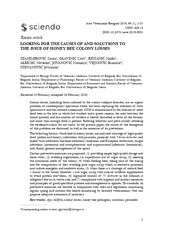| dc.description.abstract | Colony losses, including those induced by the colony collapse disorder, are an urgent problem of contemporary apiculture which has been capturing the attention of both apiculturists and the research community. CCD is characterized by the absence of adult dead bees in the hive in which few workers and a queen remain, the ratio between the brood quantity and the number of workers is heavily disturbed in favor of the former, and more than enough food is present. Robbing behavior and pests usually attacking the weakened colony do not occur. In the present paper, the causes of the emergence of this problem are discussed, as well as the measures of its prevention. The following factors, which lead to colony losses, are analyzed: shortage of high-quality food (pollen and honey); infestation with parasites, primarily with Varroa destructor, and mixed virus infections; bacterial infections (American and European foulbrood), fungal infections (nosemosis and ascosphaerosis) and trypanosomal infections (lotmariosis); and, finally, general management of the apiary. Certain preventive measures are proposed: (1) providing ample high-quality forage and clean water, (2) avoiding sugarisation, i.e. superfluous use of sugar syrup, (3) meeting the nutritional needs of the colony, (4) when feeding bees, taking care of the timing and the composition of diet, avoiding pure sugar syrup which in excessive quantities may induce energetic and oxidative stress, (5) when there is a shortage of natural feed - honey in the brood chamber - use sugar syrup with natural/artificial supplements to avoid protein starvation, (6) organized control of V. destructor in the colonies is obligatory due to its vector role, and (7) compliance with hygienic and sanitary measures and principles of good apiculture practice and management in apiaries. To conclude, all preventive measures are feasible in compliance with rules and regulations concerning regular spring and autumn bee health monitoring by licensed veterinarians, who can propose adequate treatments if necessary. | en |
| dcterms.abstract | Ристанић, Марко; Станимировић, Зоран; Стевановић, Јевросима; Вејновић, Бранислав; Јовановић, Немања, М.; Aлексић, Невенка; Главинић, Урош; | |

